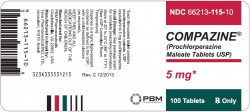Compazine (prochlorperazine) Coupons, Discounts & Cost
Compazine (prochlorperazine) is an antipsychotic drug (inhibits the central nervous system). One way to save money on the Compazine (prochlorperazine) retail cost regardless of income and insurance status is to use Compazine (prochlorperazine) coupons or discount cards from RXCoupons. Use our Compazine (prochlorperazine) coupons at your online pharmacy and receive up to 75% off the sale price each time you refill your prescription.
What is Compazine (prochlorperazine)?
Compazine (prochlorperazine) is an antipsychotic drug (inhibits the central nervous system). It also stops vomiting and reduces nausea. The drug has antipsychotic and sedative effect. Prochlorperazine weakens psychotic symptoms (hallucinations and delusions) and at the same time provides stimulating (energizing) action.
What you should know before taking Compazine (prochlorperazine)
Compazine (prochlorperazine) is used to treat schizophrenia, involutional depression (weakness, apathy, fatigue), severe nausea and vomiting.
How should I use the drug?
Take the tablets with food. The initial daily dose for severe disorders - 12.5-25 mg, with a gradual increase in the dose to a maximum daily dose of 150-300 mg. Duration of treatment: 2-3 months or more.
Nausea and vomiting: 5-10 mg 3-4 times a day. Elderly patients typically require a lower starting dose (it may be gradually increased if necessary).
What side effects may Compazine (prochlorperazine) cause?
Central and peripheral nervous system: drowsiness, dizziness, insomnia, extrapyramidal disorders (Parkinson's disease, tardive dyskinesia), paradoxical reactions (hallucinations, agitation). Digestive system: dry mouth, decreased or increased appetite, nausea, vomiting, cholestatic jaundice. Cardiovascular system: ventricular arrhythmias (especially associated with bradycardia, hypokalemia). Reproductive system: amenorrhea, hyperprolactinemia, decreased libido, dysmenorrhea, galactorrhea, abnormal ejaculation, gynecomastia. Hematopoiesis: thrombocytopenia, leukopenia, anemia, pancytopenia, eosinophilia. Allergic reactions: skin rash, urticaria, angioedema. Other reactions: weight gain, fatigue.
Compazine (prochlorperazine) main contraindications
Do not take the medication in the following cases: severe cardiovascular disease (decompensated chronic heart failure, hypotension), inhibition of CNS functions and comatose states, brain injuries, brain and spinal cord diseases, pregnancy, lactation.
Compazine (prochlorperazine) is contraindicated in pregnancy and during lactation.
Elderly patients usually require a smaller initial dose, which may be gradually increased if necessary.
Use caution in children with chronic diseases involving respiratory failure and Reye syndrome (high risk of hepatotoxicity in children and adolescents).
Compazine (prochlorperazine) special instructions
Use with extreme caution in alcoholism (susceptibility to hepatotoxic reactions), disorders of blood, breast cancer (high risk of disease progression and resistance to treatment), angle-closure glaucoma, prostatic hyperplasia, hepatic or renal failure, gastric ulcer and duodenal ulcer, diseases associated with an increased risk of thromboembolic complications, Parkinson's disease (high risk of extrapyramidal effects), epilepsy, myxedema, chronic diseases involving respiratory problems (especially in children), Reye syndrome (increased hepatotoxicity risk in children and adolescents), cachexia, in elderly patients.
Elderly patients taking Compazine may suffer from irreversible dyskinesias.
Patients must be careful when driving and performing other potentially hazardous activities that require high concentration (during the whole period of treatment).
What medicines should be avoided with Compazine (prochlorperazine)?
Compazine (prochlorperazine) enhances the effects of anxiolytics, analgesics, general anesthetics, hypnotics, ethanol.
The drug reduces the effect of anorectic drugs (except for fenfluramine).
Compazine reduces the effectiveness of apomorphine and enhances its inhibitory effect on the central nervous system. It may increase the concentration of prolactin.
Tricyclic antidepressants, maprotiline, MAO inhibitors may lengthen and strengthen the sedative and anticholinergic effects.
Lithium therapy may lead to reduced absorption from the gastrointestinal tract, increased severity of extrapyramidal disorders, early signs of lithium toxicity (nausea and vomiting).
Beta-blockers enhance the hypotensive effect of the drug. Compazine (in combination therapy with beta-blockers) may increase the risk of irreversible retinopathy, arrhythmias, and tardive dyskinesia.
Antithyroid drugs increase the risk of agranulocytosis.
Concomitant use of alpha and beta-agonists (epinephrine) and sympathomimetics (ephedrine) could lead to a paradoxical decrease in blood pressure.

